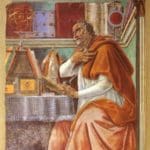Does Jesus Contradict Himself? I’m Confused! What is Up to Me?
I get all confused sometimes when I hear the Gospels. Jesus tells us that we can’t do anything without him. At the same time, he also tells us to strive to enter by the narrow door. Which one is it? Are we supposed to let Him do everything, or do we do everything, or is it a little of both? Please help me understand.
![WeinstockAlgunderWaalweg2012-08-10[VineBranches]](https://spiritualdirection.com/wp-content/uploads/2014/09/WeinstockAlgunderWaalweg2012-08-10VineBranches-150x150.jpg) JESUS SEEMS TO contradict himself. On the one hand, he tells us that “apart from me you can do nothing” (John 15:5, RSV). He is the vine, he explains in the same passage, and we are only branches, completely dependent on the flow of sap and life that comes to us through the vine. The word used for nothing in the Greek, in fact, is the simple, total negative–nothing at all, absolute zero.
JESUS SEEMS TO contradict himself. On the one hand, he tells us that “apart from me you can do nothing” (John 15:5, RSV). He is the vine, he explains in the same passage, and we are only branches, completely dependent on the flow of sap and life that comes to us through the vine. The word used for nothing in the Greek, in fact, is the simple, total negative–nothing at all, absolute zero.
 Yet on the other hand, Jesus looks us in the eye and implores us, “Strive to enter by the narrow door; for many, I tell you, will seek to enter and will not be able” (Luke 13:24, RSV). Here he begs us to put all our effort into following him, obeying him, seeking him. The Greek word for strive connotes struggle, fight, and the kind of intensity that amazes us when we watch, riveted, as Olympic athletes battle for the gold.
Yet on the other hand, Jesus looks us in the eye and implores us, “Strive to enter by the narrow door; for many, I tell you, will seek to enter and will not be able” (Luke 13:24, RSV). Here he begs us to put all our effort into following him, obeying him, seeking him. The Greek word for strive connotes struggle, fight, and the kind of intensity that amazes us when we watch, riveted, as Olympic athletes battle for the gold.
What is going on here? How can we reconcile our Lord’s injunction that we are absolutely helpless and dependent in the spiritual life with his command to fight to the death, as it were, in order to achieve spiritual maturity and salvation?
St. Paul to the Rescue?
What a relief it would be if St. Paul were to resolve the dilemma for us! But, this time anyway, he comes up short. He too, it seems, contradicts himself. In defending his apostolic credentials, he points out to the Christians in Corinth that “by the grace of God I am what I am, and his grace to me has not been ineffective. Indeed, I have toiled harder than all of them; not I, however, but the grace of God with me” (1 Corinthians 15:10).
Paul attributes all that he is and all that he has accomplished as a follower of Jesus to “the grace of God.” But in the same breath, he claims to have contributed to his Christian greatness by having “toiled harder” than anybody else. The Greek word used for toil connotes wearisome, backbreaking exertion. Etymologically, it harkens back to a term associated with the demanding, harsh, and unrelenting work of an agricultural laborer before the advent of mechanized farm equipment. That’s the kind of contribution St. Paul feels that he has made to his Christian mission, even while he affirms that God’s grace is the sole source of all the good fruits his mission has borne.
We can see no light at the end of this tunnel. We are stuck with the paradox: Our Christian life depends entirely on God’s grace, yet it also depends on our human efforts in order to make that grace bear fruit. It is a partnership.
The theologian-pope, Benedict XVI, affirmed this paradox without trying to explain it away when commenting on our Lord’s parables about seeds:1
Every Christian, then, knows well that he must do all that he can, but that the final result depends on God: this knowledge sustains him in daily toil, especially in difficult situations.
The Holy Father went on to quote the cavalier-turned-mystic, St. Ignatius of Loyola, to drive the point home:
Act as if everything depended on you, knowing that in reality everything depends on God.
The Right Proportion
…In our growth toward spiritual maturity, the mysterious partnership between God’s action and our action creates a healthy kind of tension from which spiritual dynamism flows.
…In our pursuit of intimacy with God–of the spiritual maturity that alone will yield the lasting fulfillment we are created for…God’s grace is primary, 99 percent. Our striving is secondary, 1 percent. And yet, both are necessary; without the 1 percent, the job will not be done.
…Think of cooking. The ingredients for a plate of primavera pasta come from myriad suppliers: the farmers who grow and harvest the wheat and the vegetables, the olive oil and the tomatoes (not to mention the God-given natural forces that give and sustain the lives of those plants); the transportation companies that bring those products to food-processing plants; the food-processing plants themselves; more transportation companies to put the goods in the grocery store; the grocery store team that preserves and arranges and sells…. By the time those ingredients are lined up on the kitchen counter and ready to be prepped and cooked, hundreds if not thousands of people have already contributed to the meal. That’s like the 99 percent. And yet, unless someone chops, simmers, boils, and stirs, the meal will never make it to the table. That’s like the 1 percent.
True Partners
 St. Augustine, the great bishop from North Africa who helped the Church survive the cataclysmic fall of the western Roman Empire early on in Christian history, expressed this truth cleverly when he wrote: “God created us without us: but he did not will to save us without us.”2 God created us to live in a relationship with him, not to be robots. So, even though we are entirely dependent on him for our existence and our spiritual growth, he chooses to limit his omnipotence, in a sense, in order to leave us room to become true partners in salvation history.
St. Augustine, the great bishop from North Africa who helped the Church survive the cataclysmic fall of the western Roman Empire early on in Christian history, expressed this truth cleverly when he wrote: “God created us without us: but he did not will to save us without us.”2 God created us to live in a relationship with him, not to be robots. So, even though we are entirely dependent on him for our existence and our spiritual growth, he chooses to limit his omnipotence, in a sense, in order to leave us room to become true partners in salvation history.
+++++++++++++++++++++++
1 Benedict XVI, Angelus, June 18, 2012.
2 St Augustine, Sermo 169,11,13:PL 38,923.
+++++++++++++++++++++++
Editor’s Note: This is another excerpt from Father John Bartunek’s new book “Seeking First the Kingdom” filled with “practical examples and down-to-earth wisdom which will show you how to bring Christ into each facet of your life”. Click here to learn more about the book…or if you wish to get it for a friend or relative who doesn’t read on line.
+++++++++++++++++++++++
Art: Vine branch on the way “Algunder Waalweg”, Huberbe, 10 August 2012, CCA-3.0 Unported; The Narrow Gate, 2005-12-12, http://www.geograph.org.uk/photo/90997 geograph.org.uk, author: http://www.geograph.org.uk/profile/3495 David Long, CC; Augustine of Hippo [retouched], c. 1490, Sandro Botticelli, PD-Worldwide; Wikimedia Commons.


